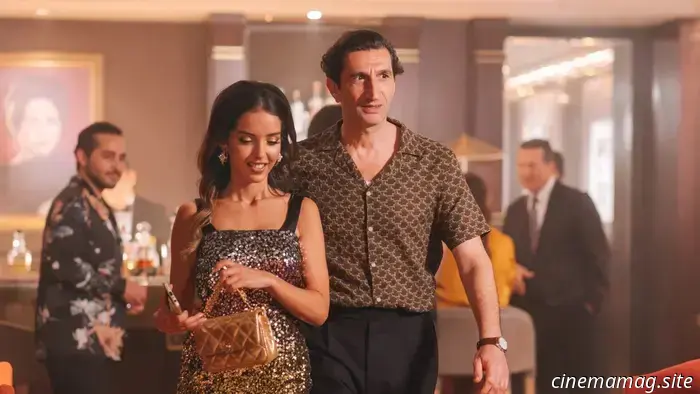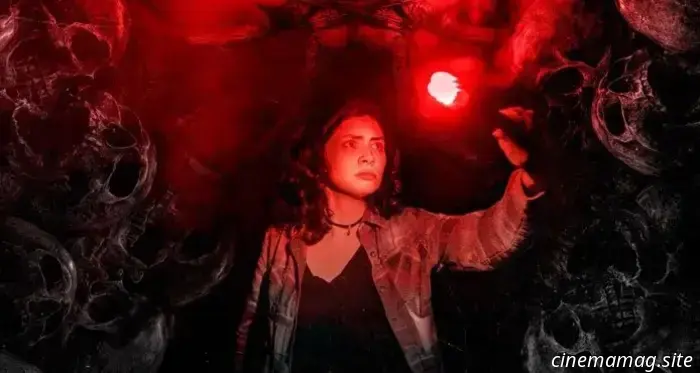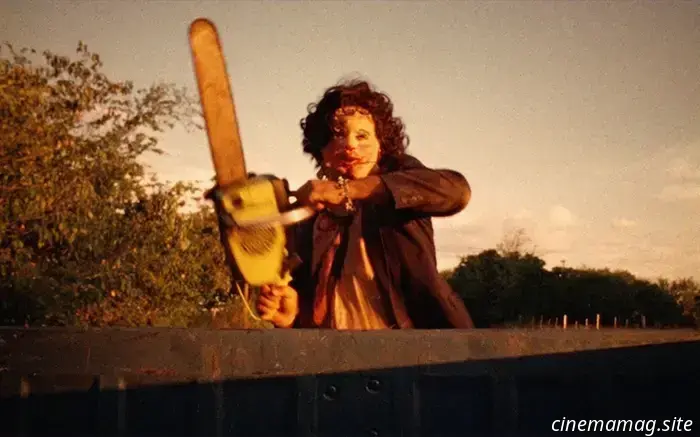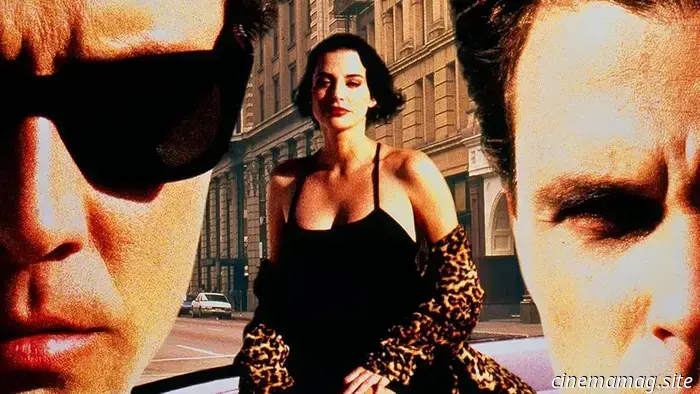
Cannes Review: Eagles of the Republic is a Whimsical Comedy-Thriller Centered Around an Egyptian Film Star.
George Fahmy (Fares Fares) is a top-tier movie star, a fact that "Eagles of the Republic" makes clear from the outset. The film opens with him in a convertible, accompanied by a beautiful woman on a soundstage, wrapping up a glamorous film shoot. He declines a call from his son and instructs his assistant to fetch him a luxury Breitling Navitimer watch for his birthday. As he drives away in his vintage Jaguar, a mural on the studio wall exclaims “Pharaoh of the Screen.” During a birthday lunch later that day, his son criticizes him for dating someone near his own age, which Fahmy brushes off as tabloid speculation (which it isn’t). He's referring to Donya (Lyna Khoundri), who plays a talentless actress providing comic relief.
Set in contemporary Egypt, "Eagles of the Republic" takes cues from recent national history, specifically the coup led by then-defense minister Abdel Fattah al-Sisi, who has been president since 2013. This film marks the conclusion of writer-director Tarik Saleh’s Cairo trilogy, following "The Nile Hilton Incident" (2017) and "Cairo Conspiracy" (2022). Fahmy’s celebrity status means that the challenges of living under an authoritarian regime primarily present as minor annoyances. The Egyptian equivalent of the MPA reviews his latest film and objects to a scene featuring two unmarried people in a car together. While Fahmy and the director initially argue to keep the scene, they soon agree to reshoot it. Meanwhile, his friend, actress Rula Haddad (Cherien Dabis), is more politically vocal and faces blacklisting. Although sympathetic to her situation, Fahmy offers her some financial help but refuses to support her publicly.
A narrative focused solely on minor inconveniences would not be engaging, and Fahmy’s privileged existence is upended when Egypt National Studios, a government-run facility, requests him to portray the president in a film about his rise to power. Hesitant to participate in such blatant propaganda, Fahmy instructs his manager to disregard them. However, after a late-night confrontation with armed thugs who threaten his son, he changes his mind.
Fahmy’s old-fashioned home studio pays tribute to the golden age of Egyptian cinema—a long period in the 20th century when it was the world’s third-largest film industry—while the faceless Egypt National Studios represents its sterile, modern counterpart, resembling CAA’s notorious “Death Star” headquarters in Century City, Los Angeles.
"Eagles of the Republic" navigates a tonal balance of playful industry satire and thriller elements, achieving this mainly through Fahmy’s perspective. Fares and Saleh, who have collaborated previously, imbue the character with empathy despite his often selfish behavior. A shadow of violence looms as the propaganda film progresses, yet nothing feels real to Fahmy unless it pertains to him. When accused of being pro-democracy and pro-human rights, he humorously counters that being a Trotskyite would be preferable. The military officials overseeing the production are merely pawns for Fahmy to outsmart, and he takes satisfaction in outmaneuvering them in small ways. Moreover, he is oblivious to the risks associated with pursuing a high-ranking general’s wife, as his inclination towards a mysterious, attractive woman aligns with his persona as the “Pharaoh of the Screen.”
The film portrays the propaganda elements they’re producing largely for comedic effect. Early on, the producers reject Fahmy’s bald cap and double chin prosthetics, insisting on a star-like appearance for the portrayal of their fearless leader—accuracy takes a back seat. “Al-Sisi has been bald since kindergarten!” Fahmy retorts before conceding and removing the makeup. Similar to the ratings-board scene, Fahmy’s approach is to create a stir, feigning opposition before quietly acquiescing. Later, on set, an actor entertains the cast and crew with impressions of former Egyptian presidents Mubarak and al-Sisi. Reflecting the themes of “The Death of Stalin” or stories from the USSR, "Eagles of the Republic" recognizes that humor allows people to test their boundaries under authoritarian regimes, particularly when the stakes can be perilous. The character of President al-Sisi is a significant presence yet is wisely introduced late in the film. Dr. Mansour (Amr Waked), a company man with few words, acts as al-Sisi’s watchdog, quietly monitoring events on and off set to ensure that the dictator's image remains pristine. Fahmy clashes with him over the film, yet it’s clear that Dr. Mansour, with his calm demeanor and piercing blue eyes, unnerves him more than the others do.
"Eagles of the Republic" also explores the artist's inherent vulnerability when taking on any role, an anxiety heightened when the project is blatant propaganda. Fahmy's speeches aim to mask his
Other articles
 The trailer for Wind and Bone showcases college campers up against the Wendigo.
Coinciding with its launch this week, a poster and trailer have surfaced online for Wind and Bone, a horror-thriller directed by Michael Tuthill and Kevin Sylvain. The film follows a group of students who come across the mythological creature known as the Wendigo during a weekend trip; check it out here... When a young woman fleeing from something joins a group […]
The trailer for Wind and Bone showcases college campers up against the Wendigo.
Coinciding with its launch this week, a poster and trailer have surfaced online for Wind and Bone, a horror-thriller directed by Michael Tuthill and Kevin Sylvain. The film follows a group of students who come across the mythological creature known as the Wendigo during a weekend trip; check it out here... When a young woman fleeing from something joins a group […]
 Is Osgood Perkins the upcoming director for the Texas Chainsaw Massacre?
Osgood Perkins is experiencing success with his latest original horror films, such as Longlegs and The Monkey, but is he contemplating a franchise? The Insneider reveals that Perkins is looking into a possible fresh interpretation of the legendary Texas Chainsaw Massacre series, infusing it with his unique mix of horror, humor, and gore.
Is Osgood Perkins the upcoming director for the Texas Chainsaw Massacre?
Osgood Perkins is experiencing success with his latest original horror films, such as Longlegs and The Monkey, but is he contemplating a franchise? The Insneider reveals that Perkins is looking into a possible fresh interpretation of the legendary Texas Chainsaw Massacre series, infusing it with his unique mix of horror, humor, and gore.
 Leatherface becomes part of Mezco's 5-Points collection with a vintage-style figure from Texas Chain Saw Massacre.
Mezco Toyz has formally introduced its retro-style 5-Points Leatherface action figure, inspired by the look of the legendary masked murderer in Tobe Hooper’s classic 1974 horror film The Texas Chain Saw Massacre. The figure can now be pre-ordered for $22; take a look at it here… SEE ALSO: Is Osgood Perkins the next Texas Chainsaw Massacre […]
Leatherface becomes part of Mezco's 5-Points collection with a vintage-style figure from Texas Chain Saw Massacre.
Mezco Toyz has formally introduced its retro-style 5-Points Leatherface action figure, inspired by the look of the legendary masked murderer in Tobe Hooper’s classic 1974 horror film The Texas Chain Saw Massacre. The figure can now be pre-ordered for $22; take a look at it here… SEE ALSO: Is Osgood Perkins the next Texas Chainsaw Massacre […]
 Experience Toothless in live-action with a fresh clip from How To Train Your Dragon.
With less than a month remaining until How to Train Your Dragon hits theaters, a clip has been released online for Dean DeBlois’ live-action reinterpretation of the cherished animated movie. Take a look at it below, along with two featurettes that highlight the performances of Mason Thames as Hiccup and Gerard Butler as Chief Stoick… On the […]
Experience Toothless in live-action with a fresh clip from How To Train Your Dragon.
With less than a month remaining until How to Train Your Dragon hits theaters, a clip has been released online for Dean DeBlois’ live-action reinterpretation of the cherished animated movie. Take a look at it below, along with two featurettes that highlight the performances of Mason Thames as Hiccup and Gerard Butler as Chief Stoick… On the […]
 World of Warships: Legends is set to launch on Steam this month, bringing naval combat to the platform.
World of Warships: Legends is launching on Steam this month, with a closed beta scheduled from May 23rd to 26th. When this console and mobile iteration of the franchise is released, it will feature over 500 warships and more than 100 Commanders right from the start. Check out the new trailer below... Aspiring...
World of Warships: Legends is set to launch on Steam this month, bringing naval combat to the platform.
World of Warships: Legends is launching on Steam this month, with a closed beta scheduled from May 23rd to 26th. When this console and mobile iteration of the franchise is released, it will feature over 500 warships and more than 100 Commanders right from the start. Check out the new trailer below... Aspiring...
 Casey Chong presents a list of mobster films you may have overlooked… Mob films have existed nearly as long as cinema itself, dating back to the 1930s with classics such as The Public Enemy and Scarface. Some of the most celebrated and recognized mob movies began to emerge from the New Hollywood era of the 1970s onwards with […]
Casey Chong presents a list of mobster films you may have overlooked… Mob films have existed nearly as long as cinema itself, dating back to the 1930s with classics such as The Public Enemy and Scarface. Some of the most celebrated and recognized mob movies began to emerge from the New Hollywood era of the 1970s onwards with […]
Cannes Review: Eagles of the Republic is a Whimsical Comedy-Thriller Centered Around an Egyptian Film Star.
George Fahmy (Fares Fares) is an elite movie star of the utmost caliber, a fact that "Eagles of the Republic" makes clear from the very beginning. We are introduced to him on a soundstage, sharing a convertible with a stunning woman as they conclude a dazzling film shoot. He declines a call from his son, directing his assistant to hurry instead.
